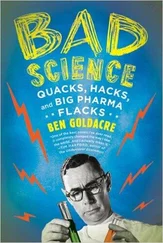Ben Goldacre - Bad Science
Здесь есть возможность читать онлайн «Ben Goldacre - Bad Science» — ознакомительный отрывок электронной книги совершенно бесплатно, а после прочтения отрывка купить полную версию. В некоторых случаях можно слушать аудио, скачать через торрент в формате fb2 и присутствует краткое содержание. Жанр: Публицистика, на английском языке. Описание произведения, (предисловие) а так же отзывы посетителей доступны на портале библиотеки ЛибКат.
- Название:Bad Science
- Автор:
- Жанр:
- Год:неизвестен
- ISBN:нет данных
- Рейтинг книги:5 / 5. Голосов: 1
-
Избранное:Добавить в избранное
- Отзывы:
-
Ваша оценка:
- 100
- 1
- 2
- 3
- 4
- 5
Bad Science: краткое содержание, описание и аннотация
Предлагаем к чтению аннотацию, описание, краткое содержание или предисловие (зависит от того, что написал сам автор книги «Bad Science»). Если вы не нашли необходимую информацию о книге — напишите в комментариях, мы постараемся отыскать её.
Bad Science — читать онлайн ознакомительный отрывок
Ниже представлен текст книги, разбитый по страницам. Система сохранения места последней прочитанной страницы, позволяет с удобством читать онлайн бесплатно книгу «Bad Science», без необходимости каждый раз заново искать на чём Вы остановились. Поставьте закладку, и сможете в любой момент перейти на страницу, на которой закончили чтение.
Интервал:
Закладка:
But journalists and miracle-cure merchants sabotage this process of shared decision-making, diligently, brick by brick, making lengthy and bogus criticisms of the process of systematic review (because they don’t like the findings of just one), extrapolating from lab-dish data, misrepresenting the sense and value of trials, carefully and collectively undermining the nation’s understanding of the very notion of what it means for there to be evidence for an activity. In this regard they are, to my mind, guilty of an unforgivable crime.
You’ll notice, I hope, that I’m more interested in the cultural impact of nonsense – the medicalisation of everyday life, the undermining of sense – and in general I blame systems more than particular people. While I do go through the background of some individuals, this is largely to illustrate the extent to which they have been misrepresented by the media, who are so desperate to present their favoured authority figures as somehow mainstream. I am not surprised that there are individual entrepreneurs, but I am unimpressed that the media carry their assertions as true. I am not surprised that there are people with odd ideas about medicine, or that they sell those ideas. But I am spectacularly, supremely, incandescently unimpressed when a university starts to offer BSc science courses in them. I do not blame individual journalists (for the most part), but I do blame whole systems of editors, and the people who buy newspapers with values they profess to despise. Specifically, I do not blame Andrew Wakefield for the MMR scare (although he’s done things I hope I would not), and I find it – let’s be very clear once again – spectacularly distasteful that the media are now revving up to hold him singly responsible for their own crimes, in regard to that débâcle.
Similarly, while I could reel out a few stories of alternative therapists’ customers who’ve died unnecessarily, it seems to me that people who choose to see alternative therapists (except for nutrition therapists, who have worked very hard to confuse the public and to brand themselves as conventional evidence-based practitioners) make that choice with their eyes open, or at least only half closed. To me this is not a situation of businessmen exploiting the vulnerable, but is rather, as I seem to keep saying, a bit more complicated than that. We love this stuff, and we love it for some fascinating reasons, which we could ideally spend a lot more time thinking and talking about.
Economists and doctors talk about ‘opportunity costs’, the things you could have done, but didn’t, because you were distracted by doing something less useful. To my mind, the greatest harm posed by the avalanche of nonsense we have seen in this book is best conceived of as the ‘opportunity cost of bullshit’.
We have have somehow become collectively obsessed with these absurd, thinly evidenced individual tinkerings in diet, distracting us from simple healthy eating advice; but more than that, as we saw, distracting us from the other important lifestyle risk factors for ill health which cannot be sold, or commodified.
Doctors, similarly, have been captivated by the commercial success of alternative therapists. They could learn from the best of the research into the placebo effect, and the meaning response in healing, and apply that to everyday clinical practice, augmenting treatments which are in themselves also effective: but instead, there is a fashion among huge numbers of them to indulge childish fantasies about magic pills, massages or needles. That is not forward-looking, or inclusive, and it does nothing about the untherapeutic nature of rushed consultations in decaying buildings. It also requires, frequently, that you lie to patients. ‘The true cost of something,’ as the Economist says, ‘is what you give up to get it.’
On a larger scale, many people are angry about the evils of the pharmaceutical industry, and nervous about the role of profit in healthcare; but these are formless and uncalibrated intuitions, so the valuable political energy that comes from this outrage is funnelled – wasted – through infantile issues like the miraculous properties of vitamin pills, or the evils of MMR. Just because big pharma can behave badly, that does not mean that sugar pills work better than placebo, nor does it mean that MMR causes autism. Whatever the wealthy pill peddlers try to tell you, with their brand-building conspiracy theories, big pharma isn’t afraid of the food supplement pill industry, it is the food supplement pill industry. Similarly, big pharma isn’t frightened for its profits because popular opinion turned against MMR: if they have any sense, these companies are relieved that the public is obsessed with MMR, and is thus distracted from the other far more complex and real issues connected with the pharmaceutical business and its inadequate regulation.
To engage meaningfully in a political process of managing the evils of big pharma, we need to understand a little about the business of evidence: only then can we understand why transparency is so important in pharmaceutical research, for example, or the details of how it can be made to work, or concoct new and imaginative solutions.
But the greatest opportunity cost comes, of course, in the media, which has failed science so spectacularly, getting stuff wrong, and dumbing down. No amount of training will ever improve the wildly inaccurate stories, because newspapers already have specialist health and science correspondents who understand science. Editors will always – cynically – sideline those people, and give stupid stories to generalists, for the simple reason that they want stupid stories. Science is beyond their intellectual horizon, so they assume you can just make it up anyway. In an era when mainstream media is in fear for its life, their claims to act as effective gatekeepers to information are somewhat undermined by the content of pretty much every column or blog entry I’ve ever written.
To academics, and scientists of all shades, I would say this: you cannot ever possibly prevent newspapers from printing nonsense, but you can add your own sense into the mix. Email the features desk, ring the health desk (you can find the switchboard number on the letters page of any newspaper), and offer them a piece on something interesting from your field. They’ll turn you down. Try again. You can also toe the line by not writing stupid press releases (there are extensive guidelines for communicating with the media online), by being clear about what’s speculation in your discussions, by presenting risk data as ‘natural frequencies’, and so on. If you feel your work – or even your field – has been misrepresented, then complain: write to the editor, the journalist, the letters page, the readers’ editor, the PCC; put out a press release explaining why the story was stupid, get your press office to harrass the paper or TV station, use your title (it’s embarrassing how easy they are to impress), and offer to write them something yourself.
The greatest problem of all is dumbing down. Everything in the media is robbed of any scientific meat, in a desperate bid to seduce an imaginary mass who aren’t interested. And why should they be? Meanwhile the nerds, the people who studied biochemistry but who now work in middle management at Woolworths, are neglected, unstimulated, abandoned. There are intelligent people out there who want to be pushed, to keep their knowledge and passion for science alive, and neglecting them comes at a serious cost to society. Institutions have failed in this regard. The indulgent and well-financed ‘public engagement with science’ community has been worse than useless, because it too is obsessed with taking the message to everyone, rarely offering stimulating content to the people who are already interested.
Читать дальшеИнтервал:
Закладка:
Похожие книги на «Bad Science»
Представляем Вашему вниманию похожие книги на «Bad Science» списком для выбора. Мы отобрали схожую по названию и смыслу литературу в надежде предоставить читателям больше вариантов отыскать новые, интересные, ещё непрочитанные произведения.
Обсуждение, отзывы о книге «Bad Science» и просто собственные мнения читателей. Оставьте ваши комментарии, напишите, что Вы думаете о произведении, его смысле или главных героях. Укажите что конкретно понравилось, а что нет, и почему Вы так считаете.





![Роман Зыков - Роман с Data Science. Как монетизировать большие данные [litres]](/books/438007/roman-zykov-roman-s-data-science-kak-monetizirova-thumb.webp)






